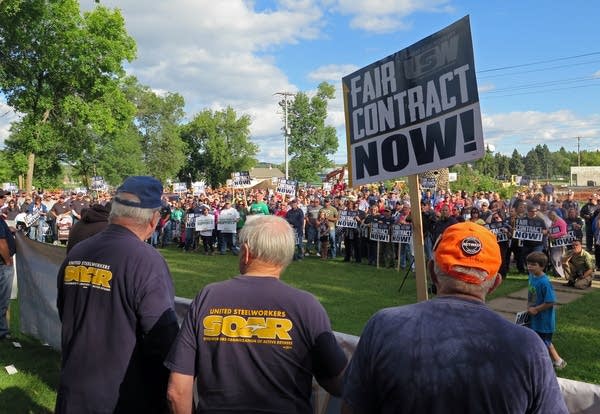Mine workers, supporters rally on Iron Range

Go Deeper.
Create an account or log in to save stories.
Like this?
Thanks for liking this story! We have added it to a list of your favorite stories.
It's crunch time for mine workers on the Iron Range.
Union contracts with U.S. Steel and ArcelorMittal — which own three of the big taconite mines on the Range, as well as steel mills across the country — are set to expire at the end of the month. The agreement with Cliffs Natural Resources, which operates three other mines on the Range, expires a month later.
All this week, workers from Minnesota to Pennsylvania are marching and rallying for fair contracts.
More than 1,000 rallied on the Iron Range Thursday in Virginia, Minn., to show their support for new labor contracts for thousands of taconite mine workers who still have jobs after layoffs have racked the industry.
Turn Up Your Support
MPR News helps you turn down the noise and build shared understanding. Turn up your support for this public resource and keep trusted journalism accessible to all.
Sen. Amy Klobuchar fired up the crowd.
"We know what matters here and what matters for the Steelworkers and all the workers of Minnesota is a fair contract now,"" she said to loud applause. "Not yesterday, not tomorrow, but now."

The United Steelworkers union negotiates a new contract every three to five years. But for the first time in a generation, bargaining is taking place during a major industry downturn: 1,500 workers have been laid off on the Iron Range this year. Iron ore and steel prices have crashed. The industry blames a flood of cheap imported steel.
John Arbogast, a worker at U.S. Steel's MinnTac plant, the state's largest taconite operation, said the company is trying to take advantage of what's always been a cyclical, up-and-down industry.
"They're trying to attack our health care, our pensions, our work schedules, all things that our grandfathers and fathers fought for, for the last 60 years," he said, "and we're having this rally because we're not going to accept it."
A spokesperson for U.S. Steel said the company would not comment on ongoing negotiations.
ArcelorMittal also declined an interview request. But in a statement, spokesperson Mary Beth Holdford said the company has lost $1.5 billion since 2010. "We cannot base our 2015 contract on a hope that a return to a new steel and commodities boom is ahead," she said.
Union leaders say health care is the biggest sticking point in the negotiations.
It's "the biggest elephant in the room," said Dan Pierce, who works at U.S. Steel's Keewatin Taconite, which has been shut down since May.
"We know it's expensive. That's something we've bargained for almost 60 years, is to get good health care in this industry," he said. "We all rely on it, our families rely on it, so do our retirees."

According to the United Steelworkers union, U.S. Steel has proposed eliminating health care benefits for retirees and requiring employees to contribute monthly premiums.
John Remington, a retired industrial relations professor at the University of Minnesota, said that's common in other industries.
"That's not just in the Iron Range and the steel industry, it's all over the country, particularly where you have an aging workforce," Remington said. "They're more expensive. And they're asking the union to share that. The union doesn't like that. But the company can't absorb these increased costs on their own indefinitely."
Earlier this year the Minnesota Legislature agreed to help the industry with some of those costs. Lawmakers temporarily cut the mineral royalty rates U.S. Steel pays the state, a move that could save the company up to $4 million. They also passed a law allowing taconite mines to apply for a break in their electricity rates.
State Rep. Carly Melin, DFL-Hibbing, told rallying mineworkers yesterday they pushed for the aid to keep workers on the job.
"For us to do that for them and to meet them halfway, and for them to turn around and then go after your benefits, your health care, your retirement, it's insulting," Melin said. "So next time they come begging to us at the Legislature, our door might not be open for them."
Fellow state Rep. Jason Metsa, DFL-Virginia, went a step further: "I'm going to say right now our door is going to be closed."

Iron Range union leaders return to Pittsbugh, where U.S. Steel is headquartered, this weekend to continue negotiations. Remington, the labor expert, said the two sides have a tough balance to strike.
"It's an attempt to balance or retain jobs while maintaining a competitive wage, and the company is trying to stay competitive in a worldwide market," Remington said.
If they can't find a balance in the next 11 days, the union said a strike is possible.


